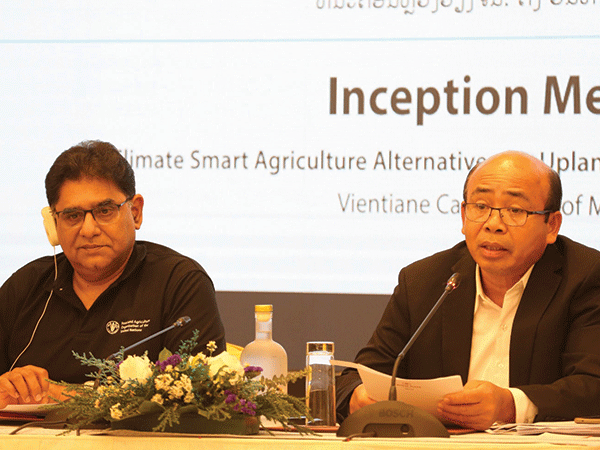New project aims to create resilient upland agriculture amid climate change
The Ministry of Agriculture and Forestry, the Food and Agriculture Organisation of the United Nations (FAO), and World Vision on Friday launched an agriculture project that aims to offer alternatives for upland production systems in Laos in a fast-changing climate environment.
The project has a budget of about US$3,500,000, funded by the Global Environment Facility (GEF) and FAO, and will be implemented by the Ministry of Agriculture and Forestry, Ministry of Natural Resources and Environment, and Ministry of Industry and Commerce, with technical support from World Vision, in Luang Prabang and Huaphan provinces until mid-2026.
 |
| Mr Nasar Hayat and Dr Nivong Sipaseuth (right) on Friday chair a meeting on climate smart alternatives for upland agriculture. |
The inception meeting for the project was attended by the Director General of the Department of Agricultural Land Management at the Ministry of Agriculture and Forestry, Dr Nivong Sipaseuth, FAO Representative to Laos Mr Nasar Hayat, and officials from related entities.
The project aims to protect about 4.5 million hectares of agricultural land, equal to 19 percent of Laos’ total land area.
Climate change is increasingly affecting Laos and its communities that rely on agriculture. Forecasted trends indicate a change in monsoon patterns, with shorter and more intense rainy seasons. This change is increasing climate hazards such as flooding and drought, causing more crop failures.
Agriculturally reliant communities, such as those in the northern upland areas, are particularly vulnerable to these threats due to their reliance on rainfall and their low-yield, low-profit cultivation of relatively lower-value commodity crops such as rice and maize.
The government, the United Nations and development partners are joining forces to address the increasing challenges posed by climate change and to build the resilience of upland farmers.
The project will focus on building an enabling environment to promote and incentivise resilient and sustainable rural landscapes in Laos, adopting resilient and sustainable land-use planning and value-chain networks in both provinces, and deploying climate-smart technologies to improve livelihood practices and support the food security and nutrition of rural households.
A major part of the project will be monitoring and evaluation, and sharing lessons learnt through national platforms.
Mr Nasar said the project was highly relevant to Laos, because the majority of people rely on agriculture for their livelihood.
Recent studies led by FAO indicate that Laos will experience more intense rainfall, leading to increased flooding, and a higher frequency of extended dry spells, leading to more drought.
All of this will result in more crop failures, so resilience to climate change through this project means people can enjoy better yields, better nutrition, a better environment, and a better life.
The Climate Smart Agriculture project offers the hope of resilient agricultural systems and the possibility for upland farmers to be better equipped to face ongoing challenges, secure their livelihoods, have food available all year round with nutritious choices, and pass on a healthier and stronger future to the next generations.
By Times Reporters
(Latest Update March 27, 2023)
|